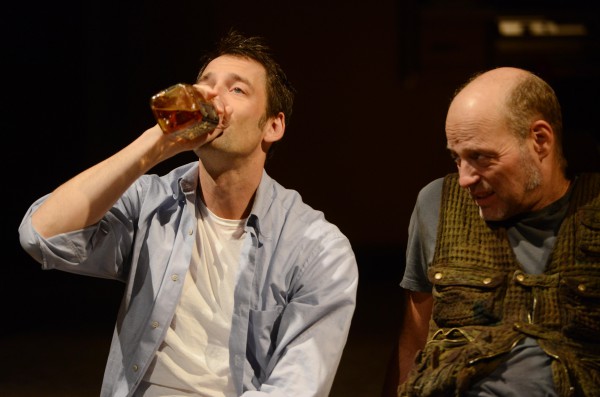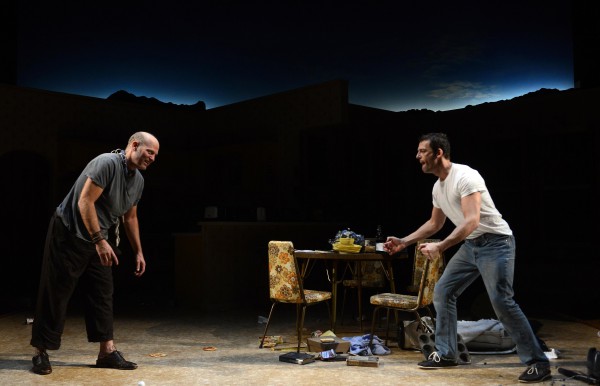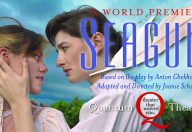Life on the Edge: the Truth about ‘True West’

The family that drinks together, thinks together. At least that’s what Austin (Ken Barnett, left) and big brother Lee (David Mogentale) hope will happen.
If you have never seen True West, I will try to tell you what you’ve been missing. It won’t be easy. This play by Sam Shepard, now at Pittsburgh Public Theater, is sneaky simple.
The basic story is so simple that anybody who watches sitcoms can get a hoot out of it. We begin with a standard setup, the good old conflict of opposites. Here it’s two brothers who are wildly different, and the play keeps growing wilder and more absurd as things between them spin out of control.
But then comes the sneaky part. The hooting and hollering produce a surreal chaos that is almost trance-like. At some point during the second act—maybe when brother Lee (played by David Mogentale) is slaughtering a typewriter with a golf club or when brother Austin (Ken Barnett) sets out to prove his manhood by stealing a toaster—you may whisper to your trusty sidekick, “Toto, I don’t think we are in Neil Simon’s The Odd Couple any more.”
And out of this chaotic trance, deeper levels come creeping. If you ask what True West is truly about, the answer is apt to be: Pardner, that’s a tricky question.
The Intellectual Poker Game
Some folks reckon it’s just a play about sibling rivalry in a dysfunctional family. Indeed it is, except that these boys lock horns over the writing of a Hollywood screenplay. Hence the unfortunate typewriter. And thus we find some intellectual types who hold it to be also a play about plays—about the creation (and destruction) of illusion.
But wait; there’s more. The screenplay the boys are wrangling over is a western. Also, the wrangling takes place in a house on the outskirts of Los Angeles, at the edge of the Mojave Desert, circa 1980. And since the larger play is titled True West, probably with ironic intent, many people will tell you that it is ultimately a play about the mythos of the American West, the shimmering mirage of the wide-open American Dream, and the doomed but never-ending quest to recapture that particular illusion—whether in a movie script, as the brothers are trying to do, or in actuality.
Well, shoot. The above may sound like a mess of pedantic cow pies. Let’s see if I can clear it up a little. I would say that if a bunch of smart fellers want to put True West in their pantheon of great plays about the elusive emptiness of the so-called American Dream, they can go right ahead. It definitely has that angle. But let’s not limit ourselves to thinking of it as such.
In the poker game called theater criticism, I would push all my chips to the front and claim that True West has a universal quality. I think it’s a play about being human and making choices, neither of which is a simple proposition. And the beauty of the play lies in how much you can get from so little. On the surface it’s no more than a wacky brother act, with a few plot twists that (as we shall see) are rather predictable. Yet despite how bizarrely the boys express themselves, the expressions ring true to life. They all do, from the slightest ruffled sensitivities to the club-swinging tantrum.
And it doesn’t matter if you have a brother, a screenplay, a Western dream or none of the foregoing. Countless little lightning strikes of feeling and meaning come shooting at you, and some of them (maybe quite a few) will go tingling all through the inner and outer reaches of your consciousness.
Now, that’s fun. It’s a painful sort of fun because what lurks at the far reaches of the consciousness can be very troubling. That’s where we keep our personal demons and dark desires, stuffed into the Pandora’s boxes that line our emotional basements and storage lockers. Typically we don’t like those creatures being stirred up the way True West can stir them. But hey, it’s more fun than therapy. And it might even do a guy or gal some good.
A Brief Synopsis
The younger brother in this play is Austin. He’s the white sheep of the family, an Ivy League graduate pursuing a career as a screenwriter. To work on his next big project, he has left his wife and children behind and has retreated, temporarily, into the womb of his mother’s house near L.A. while mom is away on vacation.
Austin’s creative solitude is rudely interrupted when Lee shows up. Lee is more than the black sheep. He’s the billy goat from Hell and as sinister as a desert rattlesnake. In fact, having been on the lam in the Mojave, Lee has come home to guzzle beer and burgle the houses of Mom’s affluent neighbors. Naturally, little brother is aghast.
Austin: “You’re going to get picked up if you start walking around here at night.”
Lee: “Me? … What about you? You stick out like a sore thumb.”
Lee, beer in hand and dressed from a dumpster, sneers at Austin’s immaculate preppy garb: “Look at you. You think you’re regular-looking?”
So the sniping begins. As for the somewhat predictable plot twists: Of course, it turns out that Lee himself has an idea for a screenplay. When a big-time producer (played by Dan Shor) visits to discuss Austin’s project, Lee wheedles in and sells his own idea in place of Austin’s—for, after all, being a genuine high-plains drifter and grifter, it’s Lee and not the pretty boy who knows The Truth about The West, right?

Lee and Austin demonstrate the manly art of creative collaboration.
However, there remains the matter of writing the darned thing. Lee must ask for Austin’s help, and of course they get fearfully loaded in the process. Role reversal occurs, with Lee now the suffering artiste while Austin tries to play it fast and loose like big brother. You might expect that just as the boys are at last achieving a gloriously insane harmony, their mother (Mary Rawson) will arrive. I won’t tell you the unexpected way she displays her maternal looniness, though, nor how the play ends.
Closing Comments and Credits
The production at the Public marks the third time I’ve seen True West. One previous viewing was years ago on a TV screen, when I caught the PBS movie of the classic 1980s version, which had the then-young duo of Gary Sinise as Austin and John Malkovitch as Lee. The Public’s rendition took some getting used to, in part because David Mogentale—who’s in late middle age—necessarily plays Lee as a crafty older dude.
But, Mogentale and the rest of the Public’s cast do a fine job. Watching them work, I saw things in the play that I hadn’t before. And, for fresh eyes, I brought a first-timer friend. He saw something that eluded me altogether. After the play, he said, excitedly, “Lee and Austin are the same person.”
I didn’t really buy it—until I looked up True West on Sam Shepard’s website. Here’s what the author said: “I wanted to write a play about double nature, one that wouldn’t be symbolic or metaphorical or any of that stuff. I just wanted to give a taste of what it feels like to be two-sided. It’s a real thing, double nature. I think we’re split in a much more devastating way than psychology can ever reveal.”
So, shut my mouth. Go see it yourself. Shepard’s True West, directed by Pamela Berlin, runs at Pittsburgh Public Theater through Dec. 8. For dates, times, and tickets, visit the Public or call 412-316-1600.
Photos courtesy of Pittsburgh Public Theater
Mike Vargo, an experienced, longtime writer and editor based in Pittsburgh, has himself performed on stage but “not very well,” he says. So he sticks to writing about it.
Share on Social Media
Follow Entertainment Central
Latest Stories
Sign up for the EC Newsletter







